Author: Lucio Chachamovich

-
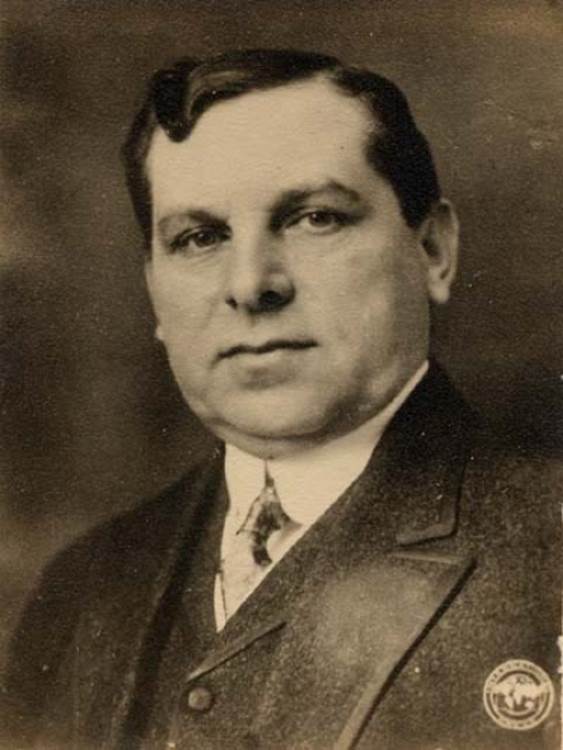 President of Congregation Shaar Hashomayim, 1904 - 1907, succeeded by his father, Lazarus Cohen, 1907 - 1914 and President again from 1914 - 1932.Photo Credit : Congregation Shaar Hashomayim Museum and Archives
President of Congregation Shaar Hashomayim, 1904 - 1907, succeeded by his father, Lazarus Cohen, 1907 - 1914 and President again from 1914 - 1932.Photo Credit : Congregation Shaar Hashomayim Museum and Archives -
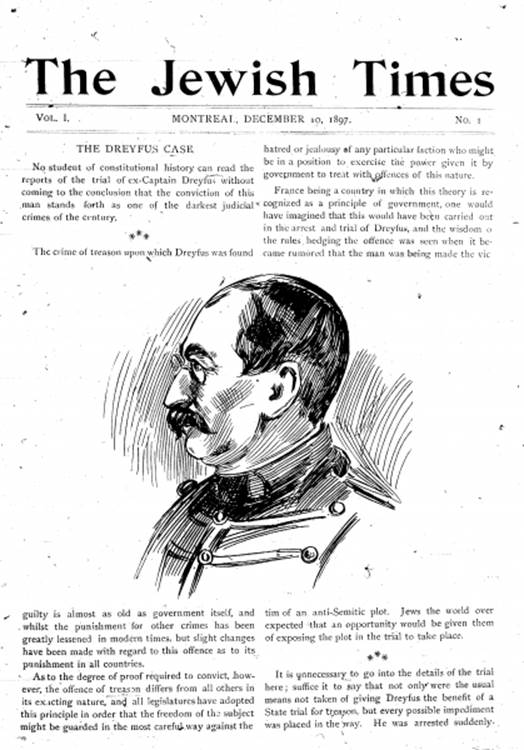 Founded in 1897, the Jewish Times was created to counter anti-semitism around the world, especially during the era of the Dreyfus trial in France.Photo Credit : Jewish Public Library - Archives
Founded in 1897, the Jewish Times was created to counter anti-semitism around the world, especially during the era of the Dreyfus trial in France.Photo Credit : Jewish Public Library - Archives -
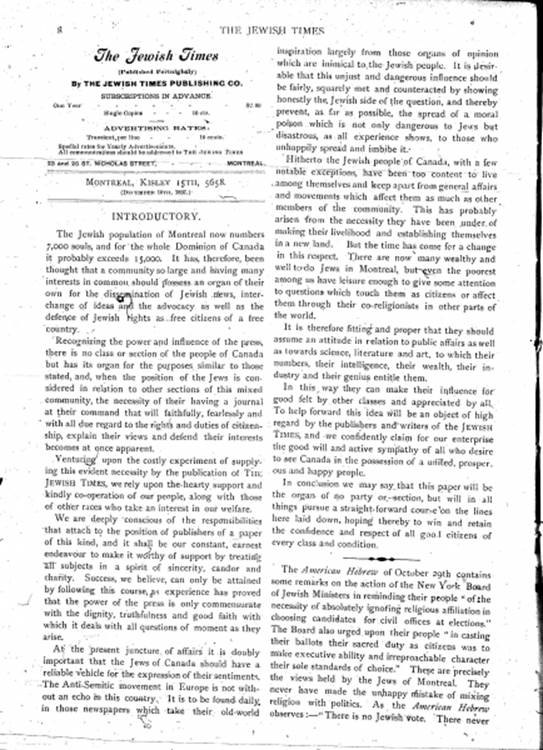 A sort of mission statement for the paper from the December 15, 1897 issue. As the first Canadian Jewish newspaper to publish in English, the Jewish Times kept the growing Montreal Jewish community informed of goings-on and guided readers as to the proper ways of living and thriving in the New World.Photo Credit : Jewish Public Library - Archives
A sort of mission statement for the paper from the December 15, 1897 issue. As the first Canadian Jewish newspaper to publish in English, the Jewish Times kept the growing Montreal Jewish community informed of goings-on and guided readers as to the proper ways of living and thriving in the New World.Photo Credit : Jewish Public Library - Archives -
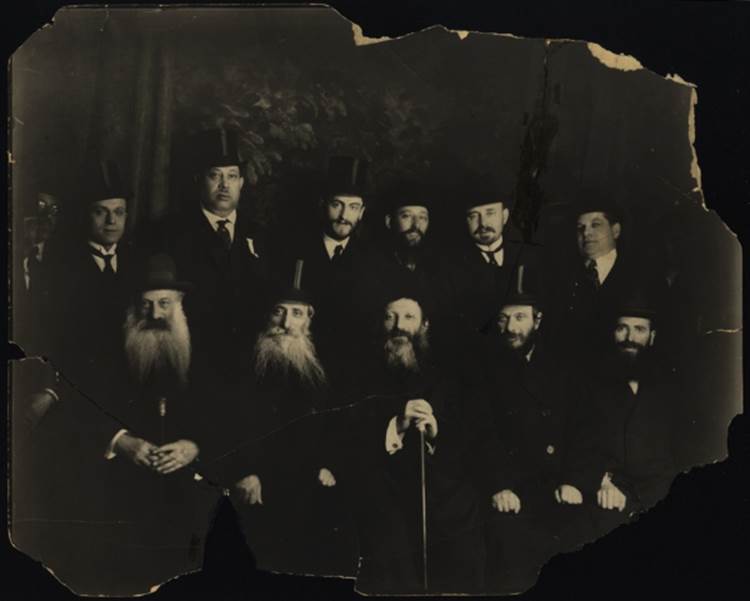 Rabbi Abraham Isaac Kook, the Chief Rabbi of Palestine (bottom centre), with Rabbis Epstein and Shapira, and local dignitaries including Lyon Cohen (top right), the mayor of Montreal (top, 2nd to left) and Rabbi Hirsch Cohen (lower left corner). Picture dated 1924.Photo Credit : Alex Dworkin Canadian Jewish Archives
Rabbi Abraham Isaac Kook, the Chief Rabbi of Palestine (bottom centre), with Rabbis Epstein and Shapira, and local dignitaries including Lyon Cohen (top right), the mayor of Montreal (top, 2nd to left) and Rabbi Hirsch Cohen (lower left corner). Picture dated 1924.Photo Credit : Alex Dworkin Canadian Jewish Archives -
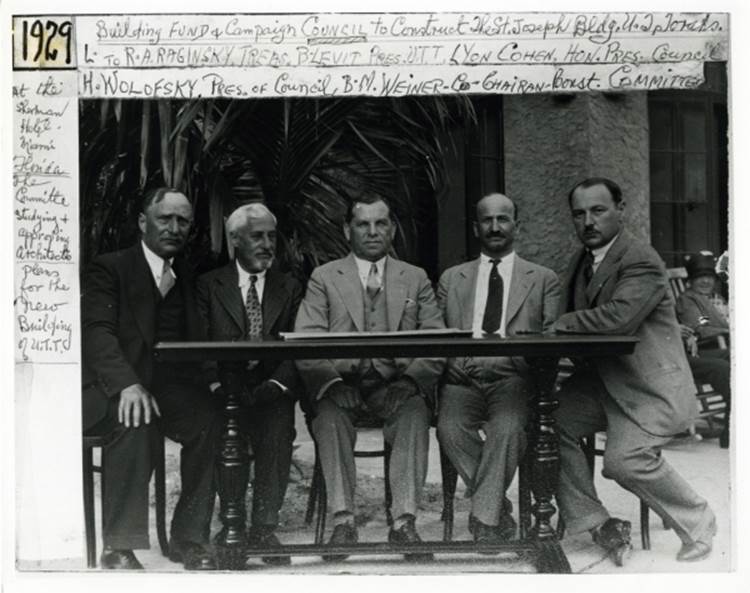 Building Fund and Campaign Council to construct the United Talmud Torah campus on St. Joseph and Jeanne-Mance. Photo taken at the Sherman Hotel in Miami, Florida in 1929. Lyon Cohen is second from left.Photo Credit : Jewish Public Library - Archives
Building Fund and Campaign Council to construct the United Talmud Torah campus on St. Joseph and Jeanne-Mance. Photo taken at the Sherman Hotel in Miami, Florida in 1929. Lyon Cohen is second from left.Photo Credit : Jewish Public Library - Archives -
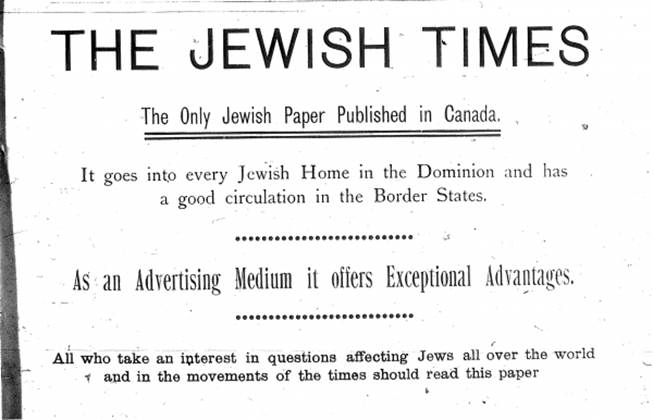 A solicitation for advertisements in the Jewish Times newspaper. From the Jewish Times, ca. 1900.Photo Credit : Jewish Public Library - Archives
A solicitation for advertisements in the Jewish Times newspaper. From the Jewish Times, ca. 1900.Photo Credit : Jewish Public Library - Archives
Lyon Cohen
Lyon Cohen was a business tycoon and community leader who co-founded the Jewish Times, Canada’s first English-language, Jewish-interest newspaper.
Born in Poland, Cohen came to Canada as a child. He moved with his family first to Ontario and later to Montreal, where he and his father, Lazarus, entered the coal business together. Cohen went on to establish himself as the owner of one of Montreal’s largest clothing corporations, the Freedman Company (in whose factory Lyon’s grandson, the poet and singer Leonard Cohen, briefly worked in the 1950s), and as the leading figure of the more affluent, West End-based “uptowner” contingent of the Jewish community. As president of the Freedman Company, he became one of the most prominent retailers in the ready-to-wear market.
Cohen served at one time or another as President of the Baron de Hirsch Institute, the Clothing Manufacturers Association of Montreal, the Montefiore Club, the first meeting of the Canadian Jewish Congress in 1919, and Congregation Sha’ar Hashomayim. His home in Westmount played host to such eminent personalities as Chaim Weizmann, Rabbi Stephen S. Wise, and Solomon Schechter. Despite his high positions, extensive connections and famous antipathy to unionizing Jewish workers and radicals, Cohen was known as a man in touch with the common person; he would greet new immigrants as they stepped off the docks, welcoming them to the Jewish community and to Montreal.
In 1897, Cohen and Samuel W. Jacobs founded the Jewish Times. It was the newspaper of the establishment, promoting speedy Canadianization of recent Eastern European arrivals and the acceptance of British customs. The Times was meant not only to inform the growing Montreal Jewish community of goings-on, but also to guide its readers into what the founders believed was the proper way of living and thriving in the New World. It was also intended to counter the rising anti-Semitism around the world, which Cohen and his more assimilated uptowner associates partially blamed on the Eastern European Jews themselves. This belief system and desire to fit in with the Anglo-Protestant elite led to conservative and often bland journalism and a de-emphasis on Jewish nationalism.
Faced with waves of immigrants who often spoke only Yiddish (which The Times labeled “a jargon of abrupt coarseness”), The Times declined in popularity and was bought in 1914 by Hirsch Wolofsky, owner of the Keneder Adler, who transformed it into the Canadian Jewish Chronicle. Cohen and Jacobs had meanwhile parlayed the publicity they received from The Times into further influence in the community. Jacobs was elected to Parliament in 1917 and Cohen became president of the Canadian Jewish Congress in 1919. When Cohen died in 1937, Samuel Bronfman, who in some ways was one of his successors, served as pallbearer at his funeral.
Special thanks to the Museum of Jewish Montreal.
Learn more:
http://faculty.marianopolis.edu/c.belanger/quebechistory/encyclopedia/LyonCohen.htm
http://www.jewishpubliclibrary.org/blog/wp-content/uploads/2010/06/Newspapers-of-Jewish-Montreal.pdf
http://www.imjm.ca/location/1323

-
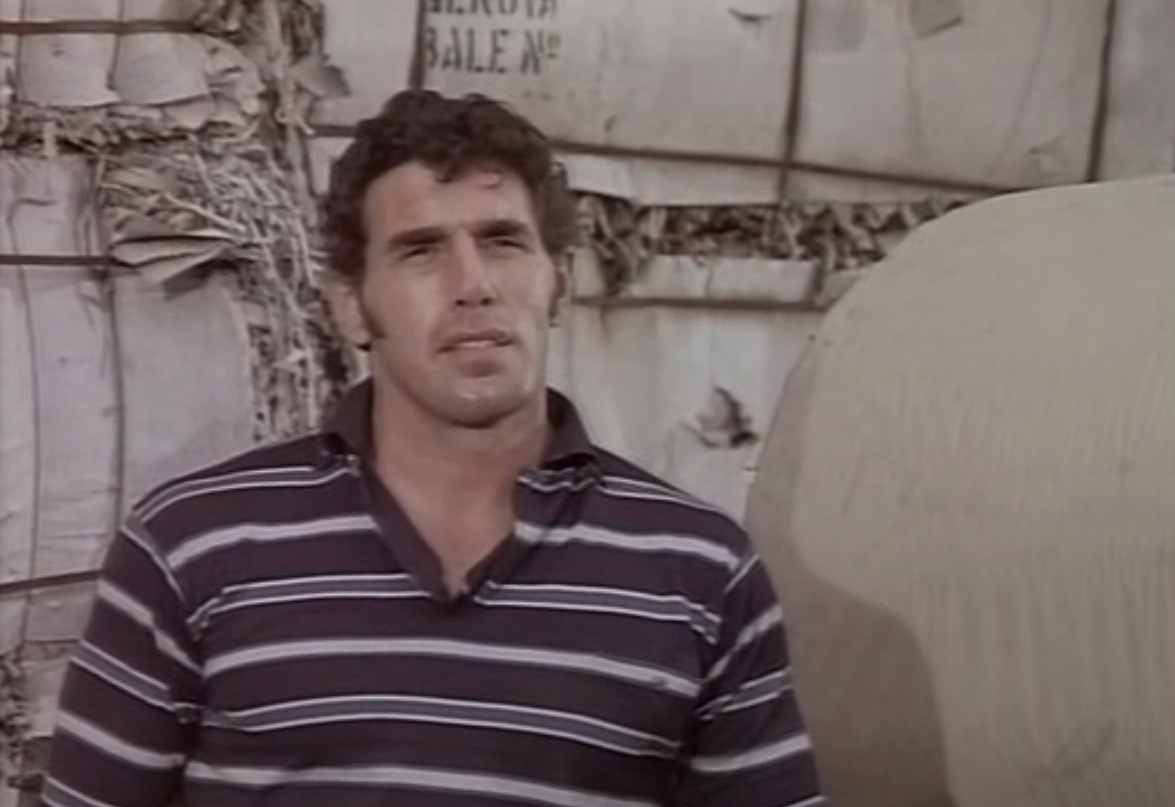 Screenshot from film Straziami, ma di baci saziami (1968).Photo Credit : Cavarrone
Screenshot from film Straziami, ma di baci saziami (1968).Photo Credit : Cavarrone -
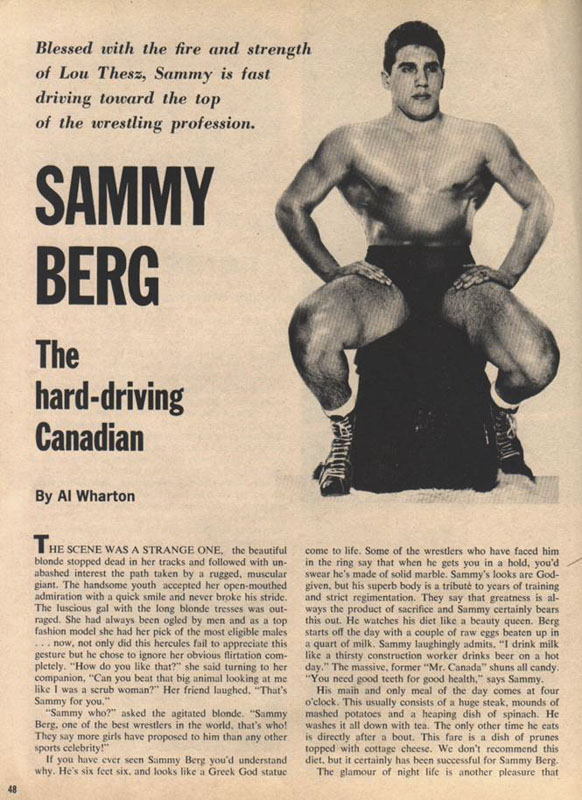 Sam wrestled under the name "Sammy Berg" in the 1950's. At 6'6" tall and 275lbs, Sam was a force to be reckoned with.Photo Credit : Samson Burke
Sam wrestled under the name "Sammy Berg" in the 1950's. At 6'6" tall and 275lbs, Sam was a force to be reckoned with.Photo Credit : Samson Burke -
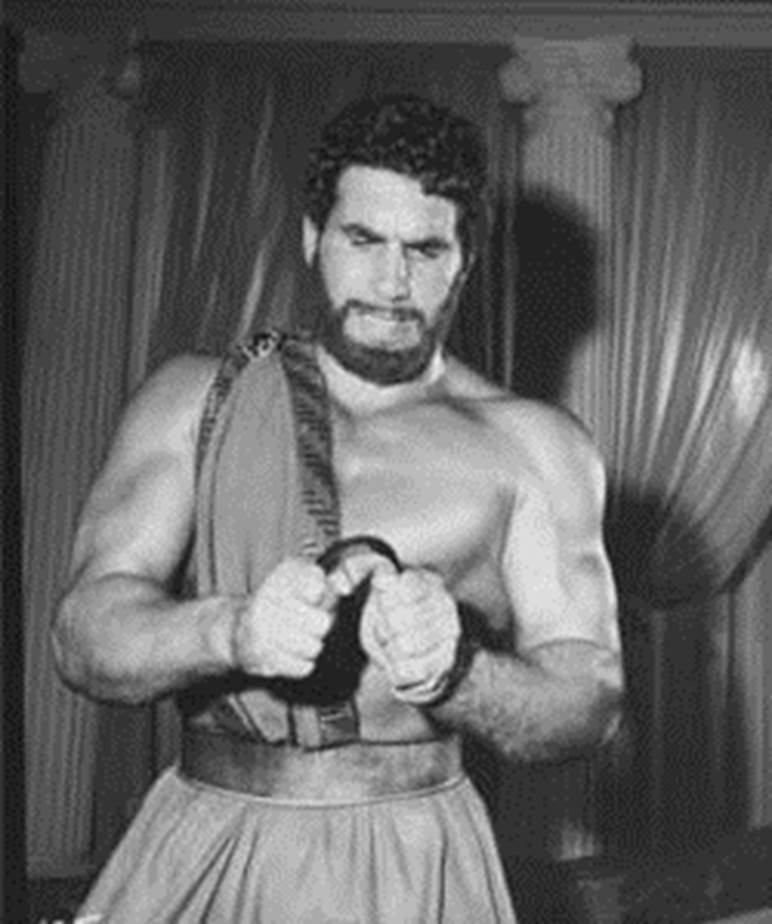 Samson Burke in THE 3 STOOGES MEET HERCULES (1962).Photo Credit : Peplum TV
Samson Burke in THE 3 STOOGES MEET HERCULES (1962).Photo Credit : Peplum TV -
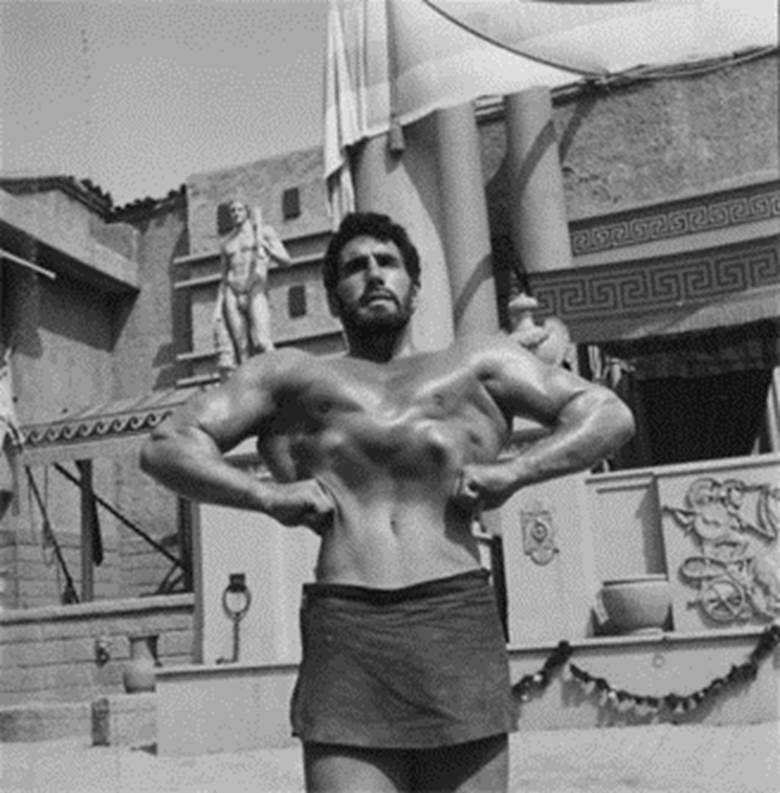 Samson Burke in THE 3 STOOGES MEET HERCULES (1962).Photo Credit : Peplum TV
Samson Burke in THE 3 STOOGES MEET HERCULES (1962).Photo Credit : Peplum TV -
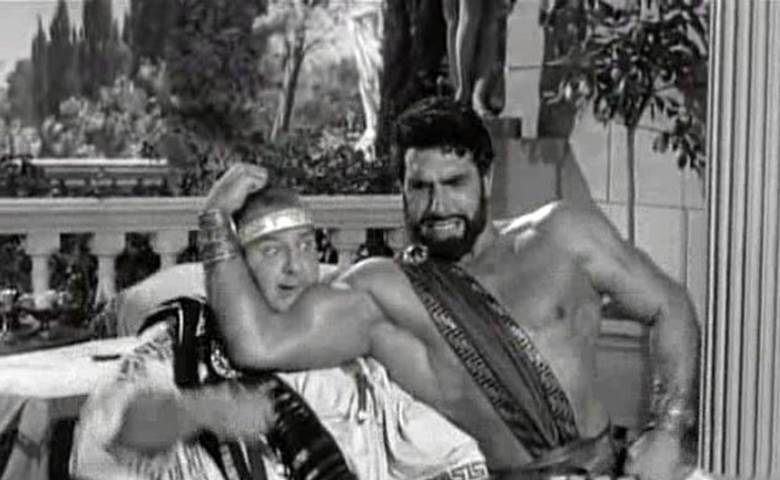 Samson Burke in THE 3 STOOGES MEET HERCULES (1962).Photo Credit : Peplum TV
Samson Burke in THE 3 STOOGES MEET HERCULES (1962).Photo Credit : Peplum TV -
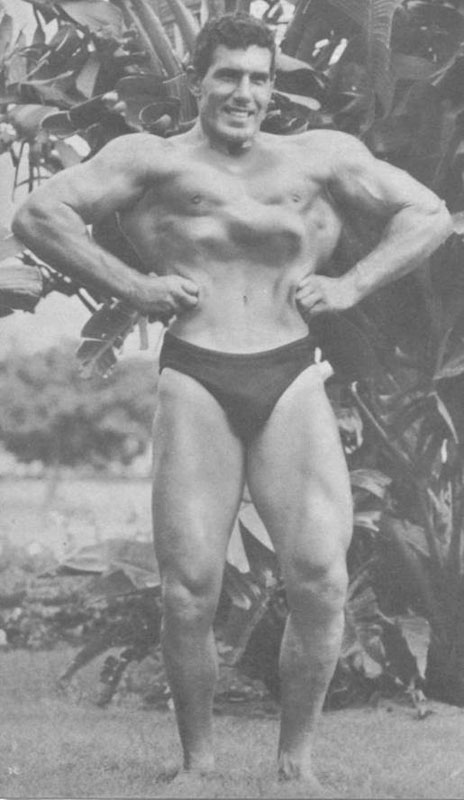 Photograph of Samson Burke -1950s.Photo Credit : Samson Burke
Photograph of Samson Burke -1950s.Photo Credit : Samson Burke -
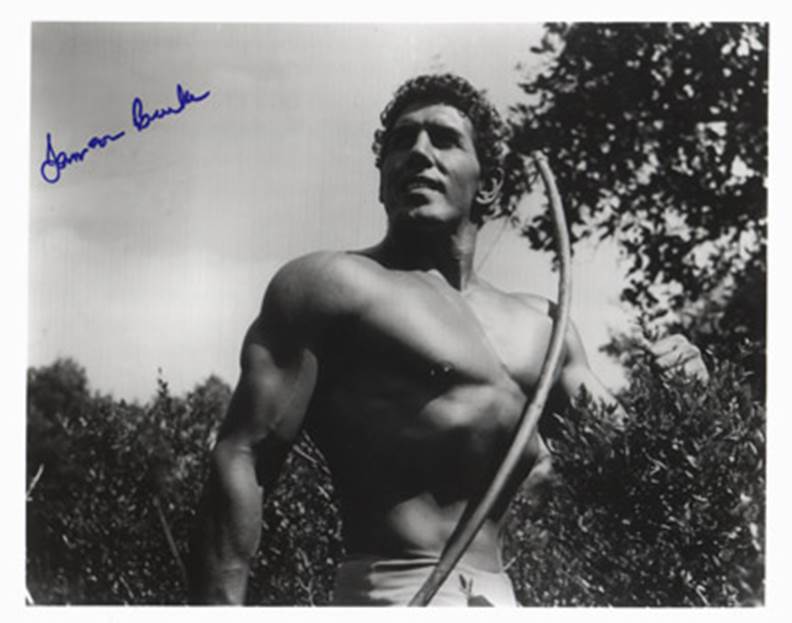 Photograph of Samson Burke -1950s.Photo Credit : Samson Burke
Photograph of Samson Burke -1950s.Photo Credit : Samson Burke
Samson Burke
Samson Burke is a multi-talented competitive Olympic-winning swimmer and wrestler, bodybuilder, and actor.
A Montreal native, Burke went to Baron Byng High School and McGill University, earning a college degree in physical education. He was a competitive swimmer from a young age, winning several titles at the provincial and national level, for individual swimming as well as for water polo. As an undergraduate, he was named “Canada’s Greatest All-Around Collegiate Athlete.”
Burke went on to compete in bodybuilding, winning the titles of “Mr. Montreal,” “Mr. Muscle Beach” and “Mr. Canada.” In the 1948 Summer Olympics, he wrestled and swam for Canada. During the 1950s, he made his mark in wrestling, using the names “Sammy Berg” and “Mr. Canada,” and sparring with the major names of his era. In the late 1950s, he won the “World Heavyweight Wrestling” title. The International Federation of Bodybuilders named him the “Top Amateur Athlete in the World” at the world bodybuilding championships.
During the 1960s, Burke’s career took a turn from sports into acting. He got the lead role of Ursus in the 1961 film The Revenge of Ursus, and appeared opposite Italian comedian Totò in Toto vs Maciste, which became his breakout film. Norman Maurer then chose him to portray the mythical Greek hero Hercules in The Three Stooges Meet Hercules. This role brought him significant fame throughout North America. Burke also played Little John in an Italian version of The Triumph of Robin Hood, Polyphemus in a 1968 Italian miniseries of The Odyssey, and appeared alongside actor Klaus Kinski in the Western, Sartana the Gravedigger. In the 1980s, Burke relocated to Hawaii, where he worked on Magnum, P.I. until the show ended in 1988.
Burke later moved to California and worked as a personal trainer until his retirement in the early 1990s.
Learn more:
http://www.samsonburke.com/
https://www.youtube.com/watch?v=9JTfJzADYs4

-
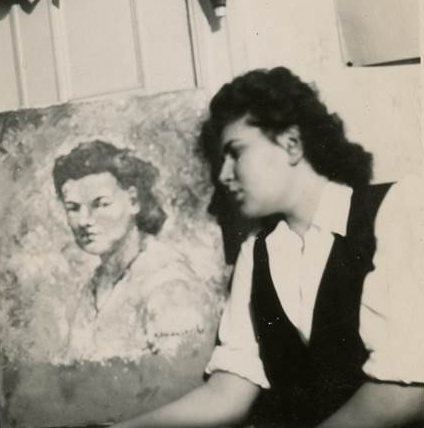 Photo Credit : Jewish Public Library - Archive and Rita Briansky
Photo Credit : Jewish Public Library - Archive and Rita Briansky -
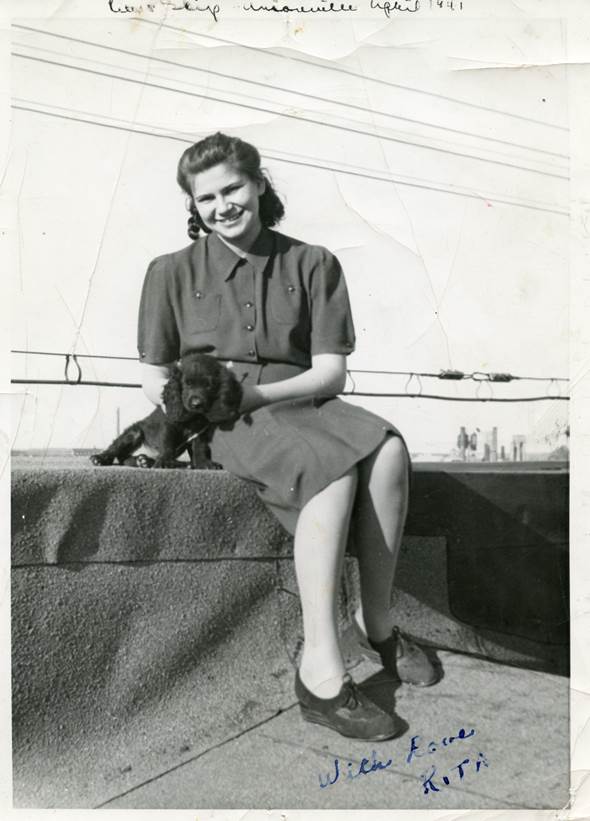 Photo Credit : Jewish Public Library - Archive and Rita Briansky
Photo Credit : Jewish Public Library - Archive and Rita Briansky -
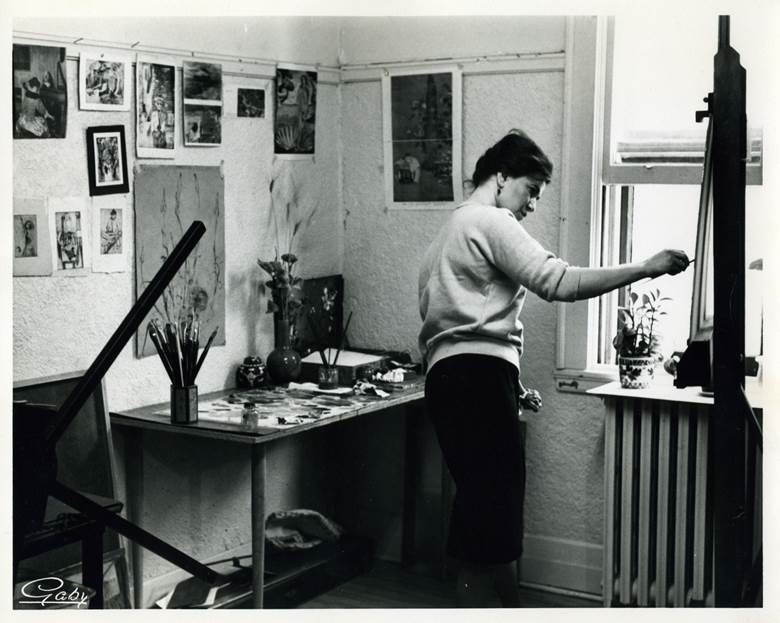 Photo Credit : Jewish Public Library - Archive and Rita Briansky
Photo Credit : Jewish Public Library - Archive and Rita Briansky -
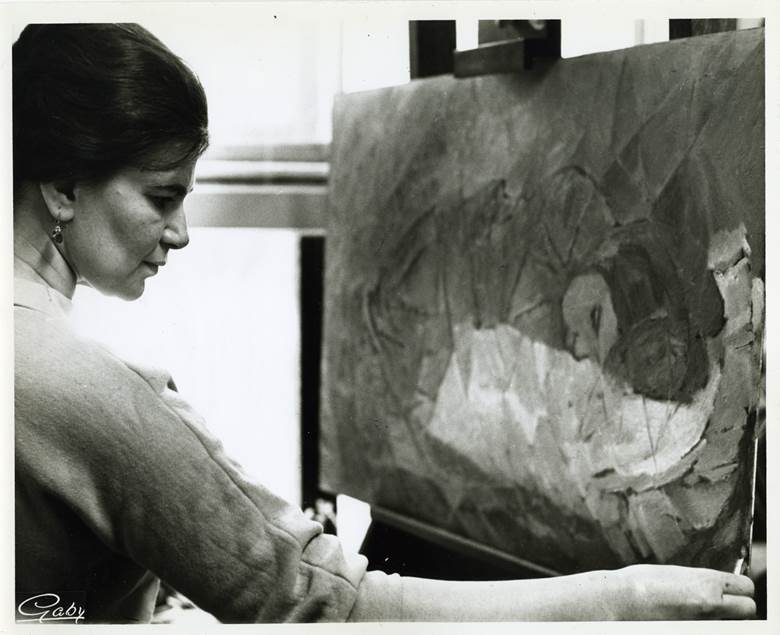 Photo Credit : Jewish Public Library - Archive and Rita Briansky
Photo Credit : Jewish Public Library - Archive and Rita Briansky -
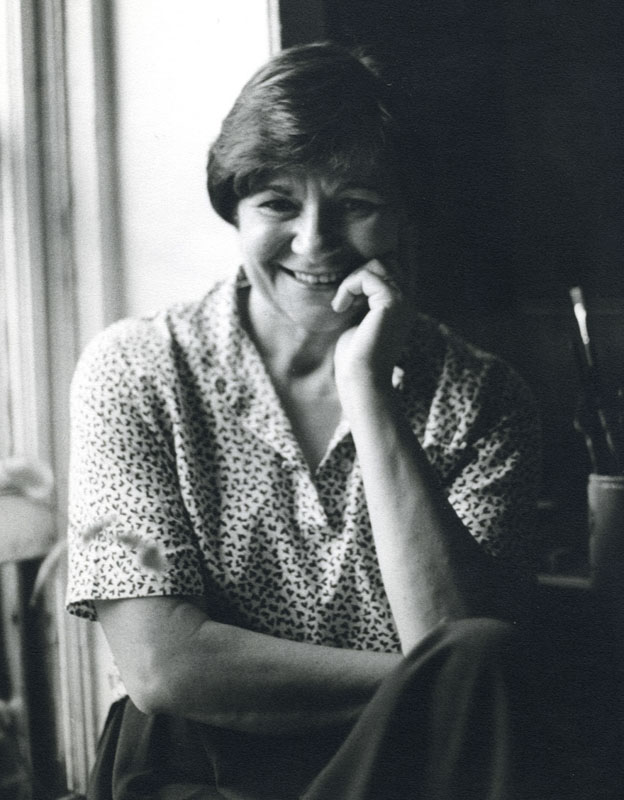 Portrait of Rita Briansky.Photo Credit : Jewish Public Library - Archives
Portrait of Rita Briansky.Photo Credit : Jewish Public Library - Archives
Rita Briansky
Rita Briansky is an award-winning painter, printmaker, etcher and teacher, whose work is included in the permanent collections of illustrious institutions such as the National Gallery in Ottawa, the Winnipeg Art Gallery and the Montreal Museum of Fine Arts.
Briansky was born in Grajewo, Poland. With her mother and two sisters, she moved to Ontario in 1929, joining Ansonville’s small Jewish community. In 1939, the family moved to Val d’Or, Quebec and then again to Montreal, in 1941. There, the family struggled financially and was unable to afford the fee for Briansky’s high school education. It was the Yiddish poet Ida Massey who found the young artist a job so she would be able to pay for her schooling. This encouragement served as the beginning of a valuable friendship, as well as helping to foster Briansky’s artistic career. Massey later introduced Briansky to Alexander Berkowitz, who at the time was giving art classes at the St. Urbain Street Y. Her training and talent quickly took the young artist to the Montreal School of Fine Arts and New York’s Arts Student League.
In 1995, following travels in Poland to her birthplace and memorial sites, Briansky produced the “Kaddish series,” reflecting on the trauma of the Holocaust. Other series have broadly used landscape, portraiture and still lifes as a passionate response to the world around her, speaking fundamentally to the human condition.
Briansky’s work has been shown in solo and group exhibitions both in Canada and internationally. Her body of work is diverse in both theme and subject matter, reflecting her interests in fields such as astronomy and the natural world, while remaining deeply rooted in her own lived experiences. She has participated in multiple collaborative projects, such as the children’s book On Stage, Please with dancer/choreographer Veronica Tennant. She is long-established within Montreal’s art community, working and living alongside a tight-knit group of artists. She has also worked as a teacher, both of art history and studio art.
Briansky married fellow painter Joseph Prezament, and they have two children together, Anna and Wendy.
Learn more:
http://www.gallery.ca/en/see/collections/artist.php?iartistid=714
http://www.mccord-museum.qc.ca/en/exhibitions/jewish-painters-of-montreal/

-
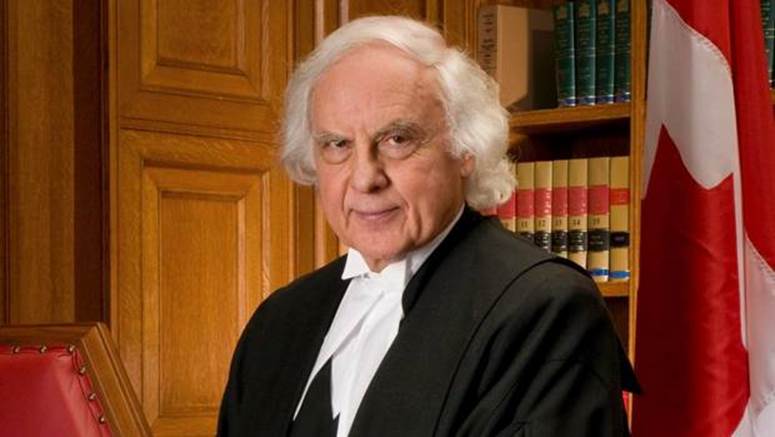 Portrait of Justice Morris Fish prior to his retirement.Photo Credit : Paul Alexander
Portrait of Justice Morris Fish prior to his retirement.Photo Credit : Paul Alexander -
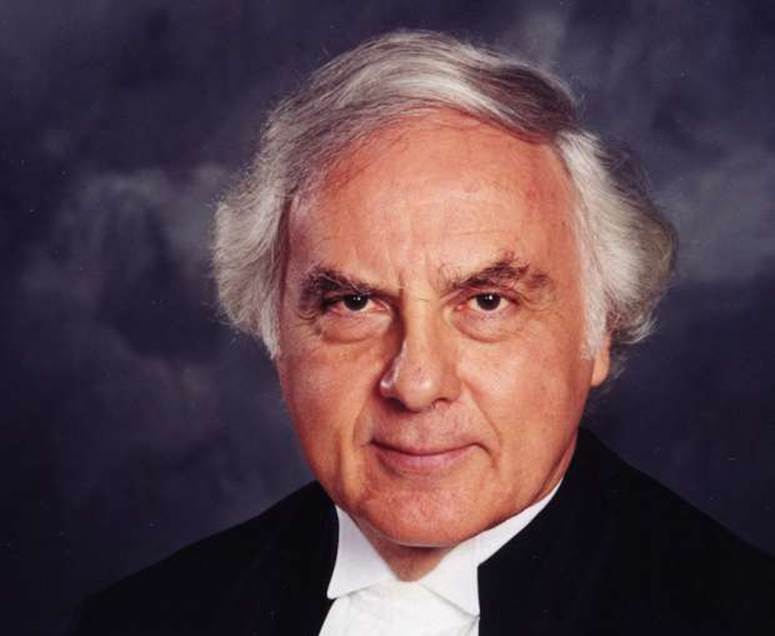 Justice Morris Fish.Photo Credit : Handout photo
Justice Morris Fish.Photo Credit : Handout photo
Justice Morris Fish
The Honourable Morris Fish is a retired Justice of the Supreme Court of Canada, as well as a renowned educator, who taught at McGill, University of Ottawa and the Université de Montréal.
Born in Montreal’s Plateau-Mont-Royal neighbourhood, Fish grew up in the heart of Montreal’s Jewish community and attended the famed Baron Byng High School. He graduated from McGill University’s Faculty of Law in 1962 with several honours and awards. He pursued doctoral studies in law at the Université de Paris, all the while writing on international events for The Montreal Star. Fish was called to the bar in Quebec, PEI and Alberta. Once called to the bar, Fish was to cease any non-legal work, but he continued writing for the media using pseudonyms from 1959 till 1970.
Fish served on the Quebec Court of Appeal from 1989 to 2003, when he was named to the Supreme Court of Canada. During his career, he ruled on many significant legal issues in Canada, such as safe injection sites, same-sex marriage and the legality of prostitution. He was also active in Legal Aid. Fish served as a Supreme Court Justice until his retirement in 2013.
Fish’s list of awards and honours is lengthy, comprising honorary doctorates, honorary fellowships, and medals for his legal contributions, including the Medal of the Bar of Montreal. His rule of thumb is, “Never cross-examine your family.”
Learn more:
https://www.barreaudemontreal.qc.ca/en/avocats/honourable-morris-j-fish-cr

-
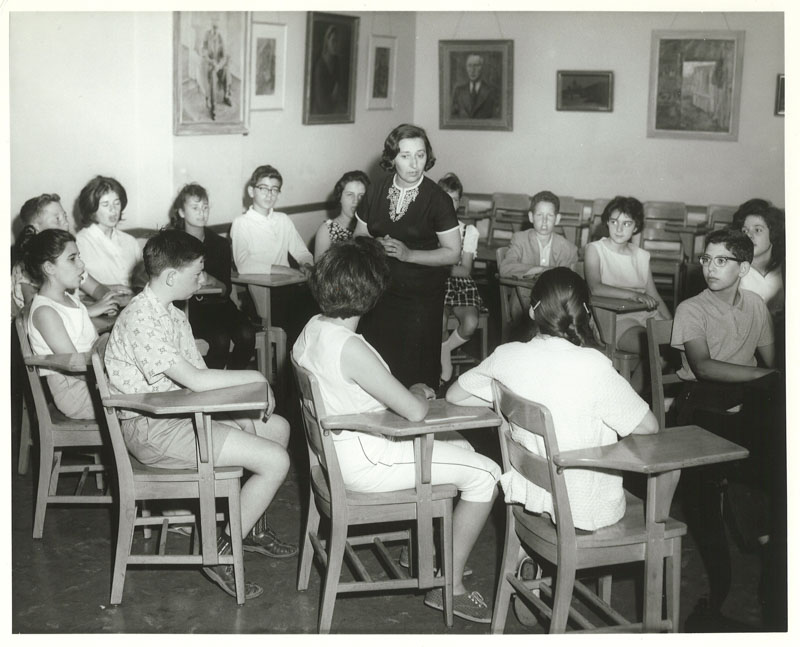 Dora Wasserman's Youth Theatre Group.Photo Credit : Jewish Public Library - Archives
Dora Wasserman's Youth Theatre Group.Photo Credit : Jewish Public Library - Archives -
 Former Secretary of State, Gerard Pelletier presents framed Jewish People's and Peretz Schools Award to Dora Wasserman for her contributions to Yiddish theatre, 1976.Photo Credit : Jewish Public Library - Archives
Former Secretary of State, Gerard Pelletier presents framed Jewish People's and Peretz Schools Award to Dora Wasserman for her contributions to Yiddish theatre, 1976.Photo Credit : Jewish Public Library - Archives -
 Children doing acting exercises, Dora Wasserman's Youth Theatre Group, 1970s.Photo Credit : Jewish Public Library - Archives
Children doing acting exercises, Dora Wasserman's Youth Theatre Group, 1970s.Photo Credit : Jewish Public Library - Archives -
 Dora Wasserman, Children's Room, Jewish Public Library (4499 Esplanade).Photo Credit : Jewish Public Library - Archives
Dora Wasserman, Children's Room, Jewish Public Library (4499 Esplanade).Photo Credit : Jewish Public Library - Archives -
 Dora Wasserman stands in front of the Sages of Chelm backdrop, 1971.Photo Credit : Alex Dworkin Canadian Jewish Archives
Dora Wasserman stands in front of the Sages of Chelm backdrop, 1971.Photo Credit : Alex Dworkin Canadian Jewish Archives -
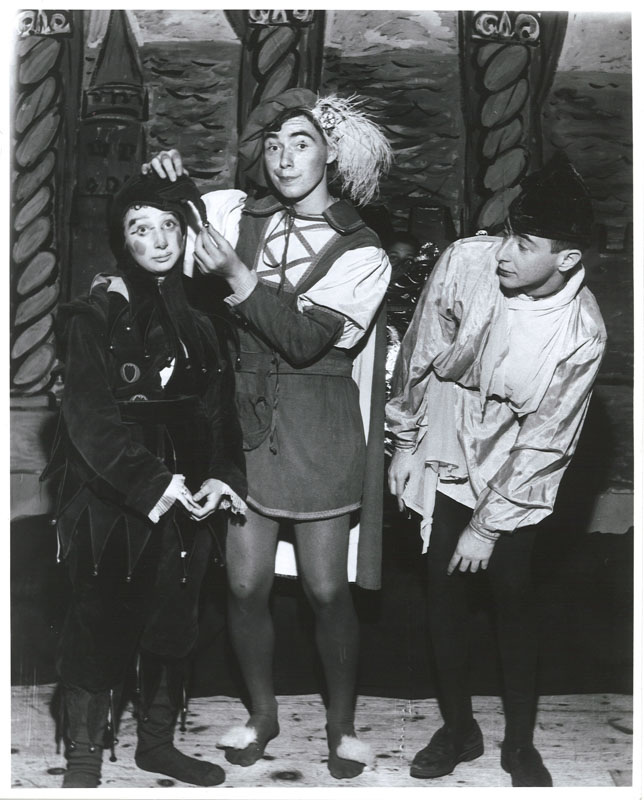 Dora Wasserman's Youth Theatre Group performers, 1960s.Photo Credit : Jewish Public Library - Archives
Dora Wasserman's Youth Theatre Group performers, 1960s.Photo Credit : Jewish Public Library - Archives -
 Dora Wasserman's Youth Theatre Group performers, 1960s.Photo Credit : Jewish Public Library - Archives
Dora Wasserman's Youth Theatre Group performers, 1960s.Photo Credit : Jewish Public Library - Archives
Dora Wasserman
Born in a small Ukrainian shtetl, Dora Wasserman went on to become a beloved Montreal actress, playwright and theatre director, who founded Canada’s only surviving Yiddish Theatre.
Wasserman, the youngest of five daughters, was born to a humble Jewish family. Her father was a locksmith and her mother was a homemaker. She was first introduced to professional theatre in 1934, through Moscow’s Rimsky Korsakov Conservatory. Wasserman then auditioned and was accepted at the Jewish Theatre of Moscow, from which she graduated in 1939.
By 1940, though, Stalin had shut down most of the country’s Yiddish theatres, and conflict was intensifying all across Europe. Wasserman and several of her colleagues fled to Kazahkstan. There, she joined the Kazakh Theatre and met her husband, a Polish refugee named Shura (Sam) Wasserman. The couple spent several years moving between Displaced Persons camps before finally settling in Montreal in 1950. They had two daughters, Ella and Bryna.
In Canada, just as she had in the refugee camps, Wasserman turned to entertaining for survival. She sang, performed and acted in local Yiddish productions, and created a children’s theatre workshop at the Jewish Public Library. This led to the formation of her company for adults, the Yiddish Drama Group, in 1956. Wasserman’s Yiddish theatre company was a big success, helping to reinvigorate Yiddish language and culture after it was nearly destroyed during the Holocaust. The company frequently toured in Canada, the US, Israel and Russia. In 1973, The Dora Wasserman Yiddish Theatre moved into the Saidye Bronfman Centre – now known as the Segal Centre for Performing Arts – where it is still in operation today.
For her dedication to the development of Yiddish and Canadian theatre, and to multiculturalism within the arts, Wasserman was recognized with the Order of Canada, inducted as a Knight of the National Order of Quebec, and given a lifetime achievement award by the Quebec Academy of Theatre.
Learn more:
http://jwa.org/encyclopedia/article/wasserman-dora
https://web.archive.org/web/20100221191200/http://www.jewish-theatre.com/visitor/article_display.aspx?articleID=444
http://theseniortimes.com/article/2009/05/dora-wasserman-if-play-is-good-you-will.html

-
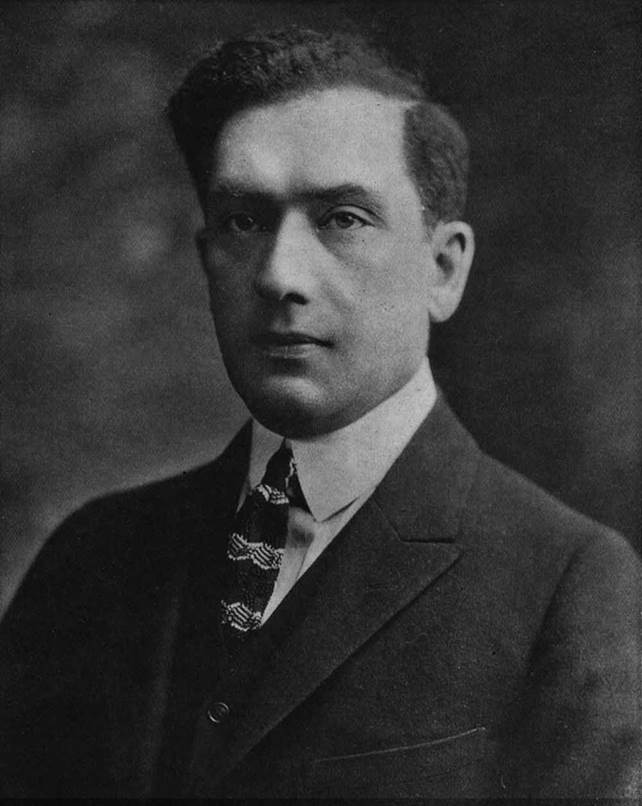 Peter BercovitchPhoto Credit : Alex Dworkin Canadian Jewish Archives
Peter BercovitchPhoto Credit : Alex Dworkin Canadian Jewish Archives
Peter Bercovitch
Peter Bercovitch was a Canadian politician who practiced law in Montreal and acted as one of the primary legal voices representing its Jewish community.
Born to an educated Jewish family, Bercovitch grew up in the vibrant, albeit humble, Plateau neighbourhood. He received his Bachelor of Civil Law from McGill University and then his Master of Laws from the Université de Montreal. In 1901, he was called to the Quebec Bar.
He was elected to the Legislative Assembly of Quebec, representing the Montreal riding of Saint Louis for the Liberal party in 1916, and continued to be re-elected until 1936. In 1938, he was acclaimed to the Canadian House of Commons and represented the Cartier riding until he passed away in 1942.
Bercovitch’s work in municipal government is especially notable due to the anti-Semitism common in Quebec during the first half of the twentieth century. With Jewish immigration stalled, and Canada’s Jews having little representation, Bercovitch acted as a voice for the community. He was also a role model for many Jewish lawyers and politicians to come.
Learn more:

